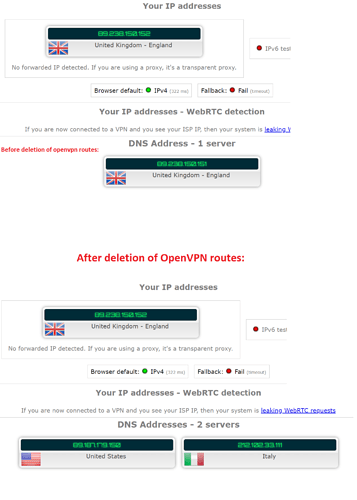Hello OpenWrt community!
I recently installed OpenWrt on my Netgear R6220 and to achieve the following configuration:
- WAN port on R6220 is chained to another router (192.168.1.x subnet) as a DHCP client. Gateway 192.168.1.1.
- Disable IPv6 on all interfaces.
- Run OpenVPN (NordVPN) on one of the wireless SSIDs - 5Ghz wifi (11.0.0.x subnet) on VPN, 2.4 GHz + LAN ports without VPN (10.0.0.x subnet).
- Delete default gateway pushed by OpenVPN and add VPN traffic (devices in 11.0.0.x) to a routing table 'vpn'.
In the default OpenVPN route configuration, VPN works and also DNS requests are made from the new IP address, making no leaks evident as shown in the image below (sharing IPs since these are assigned by VPN, privacy is not a concern)
However, once I delete the default routes, my DNS requests on ipleak.net show up from random countries, similar to using the nord DNS addresses on a non-vpn connection:
Here is the routing table as soon as VPN starts up along with default routes:
root@OpenWrt:~# ip route show
0.0.0.0/1 via 10.8.8.1 dev tun0
default via 192.168.1.1 dev eth0.2 proto static src 192.168.1.2
10.0.0.0/24 dev br-lan proto kernel scope link src 10.0.0.1
10.8.8.0/24 dev tun0 proto kernel scope link src 10.8.8.33
11.0.0.0/24 dev br-lan2 proto kernel scope link src 11.0.0.1
89.238.150.151 via 192.168.1.1 dev eth0.2
128.0.0.0/1 via 10.8.8.1 dev tun0
192.168.1.0/24 dev eth0.2 proto kernel scope link src 192.168.1.2
Here is how the route looks like after I delete the default routes pushed by OpenVPN through the following commands:
Commands:
root@OpenWrt:~# ip route del 0.0.0.0/1 via 10.8.8.1 dev tun0
root@OpenWrt:~# ip route del 128.0.0.0/1 via 10.8.8.1 dev tun0
root@OpenWrt:~# ip rule add from 11.0.0.0/24 table vpn
root@OpenWrt:~# ip rule add to 11.0.0.0/24 table vpn
root@OpenWrt:~# ip route add default table vpn dev tun0
root@OpenWrt:~# ip route add 11.0.0.0/24 dev br-lan2 src 11.0.0.1 table vpn
root@OpenWrt:~# ip route show table main
default via 192.168.1.1 dev eth0.2 proto static src 192.168.1.2
10.0.0.0/24 dev br-lan proto kernel scope link src 10.0.0.1
10.8.8.0/24 dev tun0 proto kernel scope link src 10.8.8.33
11.0.0.0/24 dev br-lan2 proto kernel scope link src 11.0.0.1
89.238.150.151 via 192.168.1.1 dev eth0.2
192.168.1.0/24 dev eth0.2 proto kernel scope link src 192.168.1.2
root@OpenWrt:~# ip route show table vpn
default dev tun0 scope link
11.0.0.0/24 dev br-lan2 scope link src 11.0.0.1
I'm trying to figure out if it is possible to route DNS from non-vpn devices via my ISP's nameservers and those on VPN via nordvpn servers simultaneously. I realize I may have to set up two dnsmasq instances, but I plan to proceed to do so only after the DNS requests from VPN clients are correctly routed. I am still learning, please guide me if any of my assumptions are wrong.
Below are my config files:
uci show network; uci show firewall; uci show dhcp
network.loopback=interface
network.loopback.ifname='lo'
network.loopback.proto='static'
network.loopback.ipaddr='127.0.0.1'
network.loopback.netmask='255.0.0.0'
network.globals=globals
network.globals.ula_prefix='fdff:986e:d4fe::/48'
network.lan=interface
network.lan.type='bridge'
network.lan.ifname='eth0.1'
network.lan.proto='static'
network.lan.netmask='255.255.255.0'
network.lan.ipaddr='10.0.0.1'
network.lan.ipv6='off'
network.lan_eth0_1_dev=device
network.lan_eth0_1_dev.name='eth0.1'
network.wan=interface
network.wan.ifname='eth0.2'
network.wan.proto='dhcp'
network.wan.peerdns='1'
network.wan_eth0_2_dev=device
network.wan_eth0_2_dev.name='eth0.2'
network.@switch[0]=switch
network.@switch[0].name='switch0'
network.@switch[0].reset='1'
network.@switch[0].enable_vlan='1'
network.@switch_vlan[0]=switch_vlan
network.@switch_vlan[0].device='switch0'
network.@switch_vlan[0].vlan='1'
network.@switch_vlan[0].ports='0 1 2 3 6t'
network.@switch_vlan[1]=switch_vlan
network.@switch_vlan[1].device='switch0'
network.@switch_vlan[1].vlan='2'
network.@switch_vlan[1].ports='4 6t'
network.lan2=interface
network.lan2.proto='static'
network.lan2.type='bridge'
network.lan2.netmask='255.255.255.0'
network.lan2.ipaddr='11.0.0.1'
network.lan2.ipv6='off'
network.vpn0=interface
network.vpn0.ifname='tun0'
network.vpn0.proto='none'
firewall.@defaults[0]=defaults
firewall.@defaults[0].syn_flood='1'
firewall.@defaults[0].input='ACCEPT'
firewall.@defaults[0].output='ACCEPT'
firewall.@defaults[0].forward='REJECT'
firewall.@zone[0]=zone
firewall.@zone[0].name='lan'
firewall.@zone[0].input='ACCEPT'
firewall.@zone[0].output='ACCEPT'
firewall.@zone[0].forward='ACCEPT'
firewall.@zone[0].network='lan'
firewall.@zone[1]=zone
firewall.@zone[1].name='wan'
firewall.@zone[1].input='REJECT'
firewall.@zone[1].output='ACCEPT'
firewall.@zone[1].forward='REJECT'
firewall.@zone[1].masq='1'
firewall.@zone[1].mtu_fix='1'
firewall.@zone[1].network='wan'
firewall.@rule[0]=rule
firewall.@rule[0].name='Allow-DHCP-Renew'
firewall.@rule[0].src='wan'
firewall.@rule[0].proto='udp'
firewall.@rule[0].dest_port='68'
firewall.@rule[0].target='ACCEPT'
firewall.@rule[0].family='ipv4'
firewall.@rule[1]=rule
firewall.@rule[1].name='Allow-Ping'
firewall.@rule[1].src='wan'
firewall.@rule[1].proto='icmp'
firewall.@rule[1].icmp_type='echo-request'
firewall.@rule[1].family='ipv4'
firewall.@rule[1].target='ACCEPT'
firewall.@rule[2]=rule
firewall.@rule[2].name='Allow-IGMP'
firewall.@rule[2].src='wan'
firewall.@rule[2].proto='igmp'
firewall.@rule[2].family='ipv4'
firewall.@rule[2].target='ACCEPT'
firewall.@rule[3]=rule
firewall.@rule[3].name='Allow-DHCPv6'
firewall.@rule[3].src='wan'
firewall.@rule[3].proto='udp'
firewall.@rule[3].src_ip='fc00::/6'
firewall.@rule[3].dest_ip='fc00::/6'
firewall.@rule[3].dest_port='546'
firewall.@rule[3].family='ipv6'
firewall.@rule[3].target='ACCEPT'
firewall.@rule[4]=rule
firewall.@rule[4].name='Allow-MLD'
firewall.@rule[4].src='wan'
firewall.@rule[4].proto='icmp'
firewall.@rule[4].src_ip='fe80::/10'
firewall.@rule[4].icmp_type='130/0' '131/0' '132/0' '143/0'
firewall.@rule[4].family='ipv6'
firewall.@rule[4].target='ACCEPT'
firewall.@rule[5]=rule
firewall.@rule[5].name='Allow-ICMPv6-Input'
firewall.@rule[5].src='wan'
firewall.@rule[5].proto='icmp'
firewall.@rule[5].icmp_type='echo-request' 'echo-reply' 'destination-unreachable' 'packet-too-big' 'time-exceeded' 'bad-header' 'unknown-header-type' 'router-solicitation' 'neighbour-solicitation' 'router-advertisement' 'neighbour-advertisement'
firewall.@rule[5].limit='1000/sec'
firewall.@rule[5].family='ipv6'
firewall.@rule[5].target='ACCEPT'
firewall.@rule[6]=rule
firewall.@rule[6].name='Allow-ICMPv6-Forward'
firewall.@rule[6].src='wan'
firewall.@rule[6].dest='*'
firewall.@rule[6].proto='icmp'
firewall.@rule[6].icmp_type='echo-request' 'echo-reply' 'destination-unreachable' 'packet-too-big' 'time-exceeded' 'bad-header' 'unknown-header-type'
firewall.@rule[6].limit='1000/sec'
firewall.@rule[6].family='ipv6'
firewall.@rule[6].target='ACCEPT'
firewall.@rule[7]=rule
firewall.@rule[7].name='Allow-IPSec-ESP'
firewall.@rule[7].src='wan'
firewall.@rule[7].dest='lan'
firewall.@rule[7].proto='esp'
firewall.@rule[7].target='ACCEPT'
firewall.@rule[8]=rule
firewall.@rule[8].name='Allow-ISAKMP'
firewall.@rule[8].src='wan'
firewall.@rule[8].dest='lan'
firewall.@rule[8].dest_port='500'
firewall.@rule[8].proto='udp'
firewall.@rule[8].target='ACCEPT'
firewall.@include[0]=include
firewall.@include[0].path='/etc/firewall.user'
firewall.@zone[2]=zone
firewall.@zone[2].forward='REJECT'
firewall.@zone[2].name='vpn'
firewall.@zone[2].output='ACCEPT'
firewall.@zone[2].masq='1'
firewall.@zone[2].mtu_fix='1'
firewall.@zone[2].input='REJECT'
firewall.@zone[2].network='vpn0'
firewall.@forwarding[0]=forwarding
firewall.@forwarding[0].dest='vpn'
firewall.@forwarding[0].src='lan'
firewall.@zone[3]=zone
firewall.@zone[3].network='lan2'
firewall.@zone[3].input='ACCEPT'
firewall.@zone[3].name='lan2'
firewall.@zone[3].output='ACCEPT'
firewall.@zone[3].forward='ACCEPT'
firewall.@forwarding[1]=forwarding
firewall.@forwarding[1].dest='wan'
firewall.@forwarding[1].src='lan'
firewall.@forwarding[2]=forwarding
firewall.@forwarding[2].dest='vpn'
firewall.@forwarding[2].src='lan2'
firewall.@forwarding[3]=forwarding
firewall.@forwarding[3].dest='wan'
firewall.@forwarding[3].src='lan2'
dhcp.@dnsmasq[0]=dnsmasq
dhcp.@dnsmasq[0].domainneeded='1'
dhcp.@dnsmasq[0].localise_queries='1'
dhcp.@dnsmasq[0].rebind_protection='1'
dhcp.@dnsmasq[0].rebind_localhost='1'
dhcp.@dnsmasq[0].local='/lan/'
dhcp.@dnsmasq[0].domain='lan'
dhcp.@dnsmasq[0].expandhosts='1'
dhcp.@dnsmasq[0].authoritative='1'
dhcp.@dnsmasq[0].readethers='1'
dhcp.@dnsmasq[0].leasefile='/tmp/dhcp.leases'
dhcp.@dnsmasq[0].localservice='1'
dhcp.@dnsmasq[0].confdir='/tmp/dnsmasq.d'
dhcp.@dnsmasq[0].resolvfile='/tmp/resolv.conf.vpn'
dhcp.lan=dhcp
dhcp.lan.interface='lan'
dhcp.lan.start='100'
dhcp.lan.limit='150'
dhcp.lan.leasetime='12h'
dhcp.lan.dhcpv6='disabled'
dhcp.wan=dhcp
dhcp.wan.interface='wan'
dhcp.wan.ignore='1'
dhcp.odhcpd=odhcpd
dhcp.odhcpd.maindhcp='0'
dhcp.odhcpd.leasefile='/tmp/hosts/odhcpd'
dhcp.odhcpd.leasetrigger='/usr/sbin/odhcpd-update'
dhcp.odhcpd.loglevel='4'
dhcp.lan2=dhcp
dhcp.lan2.start='100'
dhcp.lan2.leasetime='12h'
dhcp.lan2.limit='150'
dhcp.lan2.interface='lan2'
root@OpenWrt:~# ls -l /etc/resolv.* /tmp/resolv.*; head -n -0 /etc/resolv.* /tmp/resolv.*
lrwxrwxrwx 1 root root 16 May 17 00:02 /etc/resolv.conf -> /tmp/resolv.conf
-rw-r--r-- 1 root root 32 Jul 1 02:18 /tmp/resolv.conf
-rw-r--r-- 1 root root 39 Jul 1 02:16 /tmp/resolv.conf.auto
-rw-r--r-- 1 root root 50 Jul 1 03:01 /tmp/resolv.conf.vpn
==> /etc/resolv.conf <==
search lan
nameserver 127.0.0.1
==> /tmp/resolv.conf <==
search lan
nameserver 127.0.0.1
==> /tmp/resolv.conf.auto <==
# Interface wan
nameserver 192.168.1.1
==> /tmp/resolv.conf.vpn <==
nameserver 103.86.96.100
nameserver 103.86.99.100
